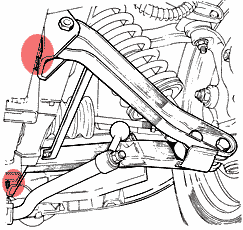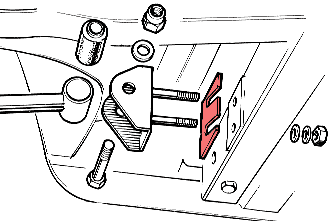Wheel Alignment Specs.
Front:
| MkI & MkII Spitfire | Kerb Condition (unladen) |
| Camber | 2° positive ± 1° |
| Caster | 3° ± 1° |
| King Pin Inclination | 6.75° ± 1° |
| Wheel Alignments | 1/16-1/8″ toe-in (1.59-3.18 mm) |
| MkIII Spitfire | Kerb Condition (unladen) |
| Camber | 3° positive ± 1° |
| Caster | 3.5° ± 1° |
| King Pin Inclination | 5.75° ± 1° |
| Wheel Alignments | 1/16-1/8″ toe-in (1.59-3.18 mm) |
| MkIV Spitfire | Kerb Condition (unladen) |
| Camber | 3° positive ± 1° |
| Caster | 4° ± 1° |
| King Pin Inclination | 5.75° ± 1° |
| Wheel Alignments | 1/16-1/8″ toe-in (1.59-3.18 mm) |
| 1500 Spitfire | Kerb Condition (unladen) | Laden Condition (2 passengers) |
| Camber | 3° positive ± 1° | 2° positive ± .5° |
| Caster | 4° ± 1° | 4.5° ± .5° |
| King Pin Inclination | 5.75° ± 1° | 6.75° ± .75° |
| Wheel Alignments | 1/16-1/8″ toe-in (1.59-3.18 mm) | 0-1/16″ toe-in (0-1.59 mm) |
| GT6 (all years) | Kerb Condition (unladen) |
| Camber | 2.75° positive ± 1° |
| Caster | 3.5° ± 1° |
| King Pin Inclination | 6° ± 1° |
| Wheel Alignments | 1/16-1/8″ toe-in (1.59-3.18 mm) |

Remove or add shims equally to both lower wishbone brackets as necessary. Add shims to go negative, remove shims to go positive. One shim equals about 1 degree.
Rear:
A quick note about rear alignment: Yes, the rear tires should look very angled (compared to a modern car’s alignment). It is due to the car’s suspension design. The designers came up with this configuration so that during hard cornering the outside tire will be pushed vertically (maximum tire contact).
| MkI, MkIII & MkIII | Kerb Condition |
| Camber | 0.5° positive ± 1° |
| Toe-out | 1/16-1/8″ (.79-2.38 mm) |
| MkIV & 1500 | Kerb Condition | Laden Condition (2 passengers) |
| Camber* | 1° negative ± 1° | 3.75° negative ± 1°*** |
| Toe-out** | 1/32-3/32″ (.79-2.38 mm) | – |
| Toe-in** | – | 0-1/16″ (0-1.59 mm) |
| notes: | ||
| * Camber: | No provision is made for adjustment to camber angle. Camber angles found to be outside the above limits are generally indicative of a weak or incorrectly set spring, or wear in the vertical link bushes. | |
| ** Toe-in/Toe-out | Rear wheel toe-in/toe-out dimensions vary as given according to the load condition of the vehicle. In addition rear wheel alignment is also influenced by the condition of the rear spring and wear factors in the vertical link linkage. It is important therefore before altering rear wheel alignment, that the causes necessitating adjustment are understood. | |
| *** a 1967 Triumph Service Bulletin states Spitfires should have 3° negative for a static laden condition (full of fuel, oil and water plus 120 lbs. weight on each front seat) | ||

